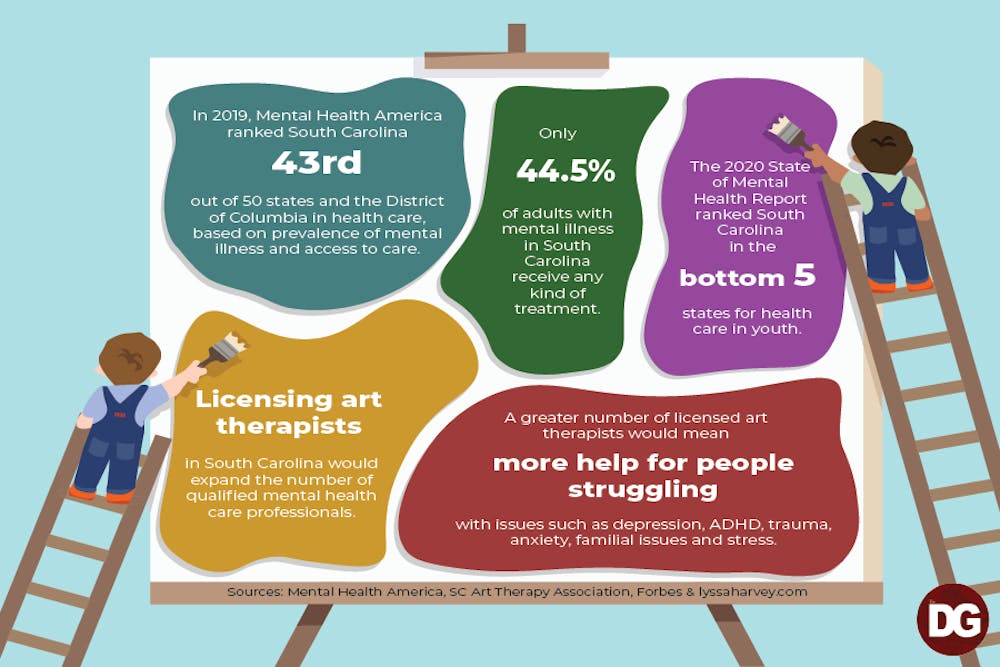By becoming an advocate for art therapy or other kinds of psychotherapy within one’s community, residents within South Carolina can do their part to improve mental health care and enhance the lives of the people in their state.
In the 1970s a small team of mental health professionals in South Carolina began meeting to promote awareness and support for their specialized branch of psychotherapy. Today, that small group has grown into the South Carolina Association of Art Therapists, a branch of the American Art Therapy Association (AATA). Together these foundations are taking important steps toward improving mental health care in South Carolina and beyond.
According to the American Art Therapy Association (AATA), "Art therapy is used to improve cognitive and sensorimotor functions, foster self-esteem and self-awareness, cultivate emotional resilience, promote insight, enhance social skills, reduce and resolve conflicts and distress and advance societal and ecological change."
It is a branch of therapy that focuses on encouraging patients to express themselves through artwork and to use creativity to gain new insights into their personal identity or past experiences. Art therapists commonly use a technique called "active imagination," developed by psychologist Carl Jung, which works to help the patient visualize the unconscious through visual images.
These mental health care workers are found in a variety of environments that include prisons, hospitals, schools, trauma centers, veteran's clinics and rehabilitation facilities. A local example is Katie Hinson, the president of the AATA's South Carolina chapter, who worked as an art therapist at Rikers Island, helping inmates to use art as a tool for healing.
Although the practice of incorporating art and creative expression into psychotherapy dates back to the 1940s, groups such as the AATA still have to advocate for greater support and acceptance of the field. It is common for the public to have misconceptions about the work these mental health providers do, often confusing the term "art therapy" with products such as adult coloring books and the services of individuals who are not qualified art therapists.
The beneficial nature of working with one of these therapists is supported by science. For instance, an article by NPR cited a study that found that creating art activates the brain's reward center and thus can be used to help individuals struggling with addiction, mood disorders and eating disorders.
Another study showed that 45 minutes of creating art with an art therapist significantly reduced levels of the hormone cortisol, in turn reducing feelings of stress. However, most studies up until this point have been based on individual case studies with insufficient comparable data that do not provide many detailed, helpful findings. If there were a greater awareness and understanding of art therapy's place in the mental health community, more in-depth and larger experimental studies could be conducted to promote discoveries that would advance the practice and allow art therapists to better treat their patients.
The South Carolina American Art Therapy Association (SCAATA) is actively working to achieve this level of awareness and support for art therapists. In addition to the organization's events and campaigns to promote education and support for art therapists, it is also currently collecting endorsement letters to bring to state representatives when they begin to advocate for the state's first art therapy bill.
Specifically, the group is looking to achieve state licensure for South Carolina art therapists, which would make treatment by these professionals more readily available to a greater number of people.
The association's website shares that according to information published by the Substance Abuse and Mental Health Services Administration in 2019, only 44.5% of adults with mental illness in South Carolina receive treatment. This is in part because South Carolina is currently facing a shortage of mental health care providers.
By licensing art therapists, people would be able to seek help from additional mental health providers regulated by the state, thus providing access to care for more people. As it is, art therapists in South Carolina don't need to have a license to practice, which fails to ensure the highest level of care for patients and to allow for proper recognition from the state government.
Anyone wishing to promote the cause can become a member of the AATA or SCAATA, or sign the online petition to license South Carolinian art therapists. The template for the online endorsement letter is also available on the SCAATA website.

